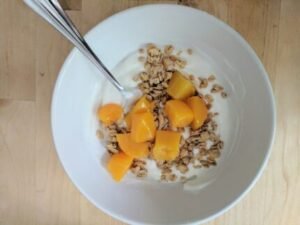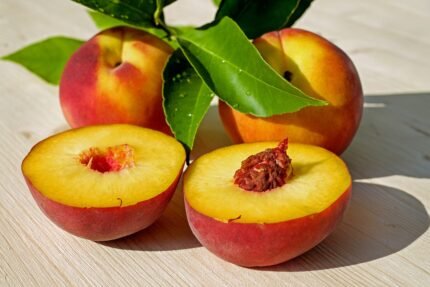Medically reviewed by Dr. Ramesh Gaddam, M.D. — Written by Sumalatha, D.N.H.E
Table of Contents
TogglePeaches are juicy fruits with a fuzzy skin and a big seed inside. They’re sweet and smell great. You can eat them fresh or cooked. Peaches come in different types, some with yellow flesh and others with white. They’re packed with vitamins and fiber, making them tasty and healthy snacks.
Peaches Nutrition
Nutritional profile of peaches per 100 grams:
| Nutrient | Amount |
|---|---|
| Calories | 39 kcal |
| Carbohydrates | 9.5 g |
| Fiber | 1.5 g |
| Sugars | 8.4 g |
| Protein | 0.9 g |
| Fat | 0.3 g |
| Vitamin A | 326 IU |
| Vitamin C | 6.6 mg |
| Calcium | 6 mg |
| Iron | 0.3 mg |
Potential Health Benefits
Potential health benefits of peaches are:

Rich in Nutrients
Peaches are packed with vitamins A and C, which support immune function and skin health.
High in Fiber
The fiber in peaches helps with digestion and can aid in maintaining a healthy weight.
Antioxidants
Peaches contain antioxidants like beta-carotene and lutein, which may reduce the risk of chronic diseases.
Heart Health
The potassium in peaches supports heart health by helping to regulate blood pressure.
Cancer Prevention
Some studies suggest that the antioxidants in peaches may help reduce the risk of certain cancers.
Skin Health
Vitamin C in peaches is important for collagen production, promoting healthy skin.
Hydration
With their high water content, peaches can help keep you hydrated, which is important for overall health.
Peaches Uses
Peaches are incredibly versatile fruits with various culinary uses:

Eating Fresh
Peaches are delicious eaten fresh, either on their own or in fruit salads.
They’re juicy and sweet, making them a refreshing snack.
Baking
Peaches are commonly used in baking, such as peach pies, cobblers, crisps, and tarts.
They add a sweet, fruity flavor to desserts.
Preserves and Jams
Peaches are often used to make preserves, jams, and fruit butters.
Their natural sweetness makes them ideal for preserving.
Smoothies
Peaches make a tasty addition to smoothies, adding sweetness and a tropical flavor.
Canning
Peaches can be canned in syrup or juice for long-term storage.
Canned peaches can be used in desserts, salads, or eaten on their own.
Sauces
Peaches can be cooked down into sauces for desserts or savory dishes.
Peach sauces are often used in glazes for meats or served over ice cream or pancakes.
Salsas
Peaches add a sweet and tangy flavor to salsas, complementing ingredients like tomatoes, onions, and cilantro.
Peach salsa is great with grilled fish or chicken.
Salads
Sliced peaches can be added to green salads or fruit salads for a sweet and juicy element.
Grilling
Grilled peaches are a delicious summer treat.
They can be served on their own, with ice cream, or alongside grilled meats.
Infusions
Peaches can be used to flavor beverages like iced tea, lemonade, or cocktails.
Peach-infused water is also refreshing.
Chutneys
Peaches can be used to make chutneys, adding a sweet and spicy flavor to accompany meats or cheeses.
Drying
Peaches can be dried and enjoyed as a snack or used in baking and cooking.
Dried peaches can also be added to trail mixes or granola.
Side Effects of Peaches
While peaches are generally safe to eat and have numerous health benefits, there are a few potential side effects to be aware of:

Allergic Reactions
Some people may be allergic to peaches, experiencing symptoms such as itching, swelling, hives, or even anaphylaxis in severe cases.
Oral Allergy Syndrome (OAS)
People who are allergic to birch pollen may experience OAS when consuming certain fruits, including peaches.
Symptoms may include itchiness or swelling of the mouth, lips, throat, and tongue.
Pesticide Residues
Peaches are often treated with pesticides to prevent pests and diseases.
Consuming peaches with high pesticide residues may pose health risks.
It’s advisable to wash peaches thoroughly before eating or opt for organic varieties when possible.
GI Issues
Eating too many peaches or consuming them in excessive quantities may cause gastrointestinal issues such as bloating, gas, or diarrhea, especially in individuals with sensitive stomachs.
High Sugar Content
Peaches are naturally sweet, containing natural sugars like fructose.
Consuming large amounts of sugary fruits, including peaches, may contribute to weight gain, blood sugar spikes, and other health issues if not consumed in moderation, particularly for individuals with diabetes or insulin resistance.
High in FODMAPs
Peaches contain sorbitol, a type of FODMAP (fermentable oligosaccharides, disaccharides, monosaccharides, and polyols).
Some people with irritable bowel syndrome (IBS) or other digestive issues may experience discomfort or exacerbation of symptoms after consuming foods high in FODMAPs, including peaches.
Pit Consumption
Peach pits contain amygdalin, which can release cyanide when metabolized.
While it’s highly unlikely to consume enough peach pits to cause cyanide poisoning from eating whole peaches, consuming crushed or ground pits or excessive amounts of peach kernel extract can be toxic.
Peaches Benefits for Skin
Peaches offer several benefits for skin health:

Vitamin C
Peaches are rich in vitamin C, which helps promote collagen production. Collagen is essential for maintaining skin elasticity and preventing wrinkles.
Antioxidants
The antioxidants in peaches, such as beta-carotene and lutein, help protect the skin from damage caused by free radicals, reducing signs of aging and promoting a healthy glow.
Hydration
With their high water content, peaches help keep the skin hydrated, improving its overall appearance and reducing dryness.
Exfoliation
The natural acids in peaches can help exfoliate the skin, removing dead skin cells and promoting cell turnover for a smoother complexion.
Brightening
The vitamin C and other antioxidants in peaches can help brighten dull skin, giving it a more radiant appearance.
Anti-inflammatory
Peaches contain compounds that have anti-inflammatory properties, which can help soothe irritated skin and reduce redness.
Acne Treatment
Some people find that the vitamins and minerals in peaches can help reduce acne and breakouts when applied topically or consumed regularly.
Prostate Health
Peaches contain nutrients like zinc and lycopene, which are beneficial for prostate health.
Lycopene, especially, has been associated with a reduced risk of prostate cancer.
Heart Health
The potassium in peaches helps regulate blood pressure, reducing the risk of heart disease.
Additionally, the fiber and antioxidants in peaches contribute to overall cardiovascular health.
Fertility
Peaches are a good source of vitamin C, which plays a role in sperm health.
Vitamin C is important for preventing sperm defects and maintaining fertility.
Muscle Function
Peaches contain potassium, an electrolyte that supports proper muscle function.
This is beneficial for maintaining strength and endurance, especially for physically active men.
Weight Management
Peaches are low in calories and high in fiber, which can aid in weight management by promoting feelings of fullness and reducing overeating.
Anti-inflammatory Properties
Compounds found in peaches have anti-inflammatory properties, which can help reduce inflammation in the body, including in joints and muscles.
Skin Health
The vitamins and antioxidants in peaches contribute to healthy skin, reducing signs of aging and promoting a clear complexion.
Low in Calories
Peaches are low in calories, making them a great snack option for those looking to manage their weight.
High in Fiber
Peaches are rich in dietary fiber, which helps promote feelings of fullness and reduces hunger cravings, aiding in weight loss efforts.
Hydration
With their high water content, peaches can help keep you hydrated, which is important for weight loss and overall health. Sometimes thirst can be mistaken for hunger.
Natural Sweetness
Peaches provide natural sweetness without added sugars, making them a healthier alternative to processed snacks and desserts.
Nutrient Density
Despite being low in calories, peaches are rich in vitamins, minerals, and antioxidants, providing essential nutrients while helping to control calorie intake.
Versatility
Peaches can be enjoyed in various ways, such as fresh, grilled, or blended into smoothies, making them a versatile ingredient in a weight loss diet.
Digestive Health
The fiber in peaches supports digestive health by promoting regular bowel movements, preventing constipation, and aiding in the removal of waste and toxins from the body.
Vitamin C
Peaches are rich in vitamin C, which helps promote collagen production.
Collagen is essential for hair growth and strength, as it supports the structure of hair follicles.
Antioxidants
The antioxidants in peaches, such as vitamin E and beta-carotene, protect hair follicles from damage caused by free radicals, promoting healthier hair growth.
Scalp Health
Peaches contain nutrients that support scalp health, including vitamins A and E, which can help soothe dry, itchy scalp conditions and promote a healthy environment for hair growth.
Hydration
With their high water content, peaches help hydrate both the scalp and hair, preventing dryness and promoting optimal conditions for hair growth.
Biotin
Peaches contain biotin, also known as vitamin B7, which is essential for healthy hair growth.
Biotin helps strengthen hair strands and promotes thickness and shine.
Natural Conditioner
The natural oils in peaches can act as a conditioner, moisturizing the hair and reducing frizz and breakage.
Folic Acid
Peaches are a good source of folic acid, which is important for cell renewal and promoting healthy hair growth.
Peaches Benefits for Pregnancy
Peaches offer several benefits for pregnancy:

Folate
Peaches are a good source of folate, a B-vitamin that is important for preventing neural tube defects in developing fetuses.
Vitamin C
Peaches are rich in vitamin C, which helps support the immune system and aids in the absorption of iron, an important nutrient during pregnancy.
Iron
While not extremely high in iron, peaches provide a small amount of this mineral, which is essential for preventing anemia during pregnancy.
Hydration
With their high water content, peaches help keep pregnant women hydrated, especially important for maintaining amniotic fluid levels and preventing dehydration.
Digestive Health
The fiber in peaches can help prevent constipation, a common issue during pregnancy, by promoting regular bowel movements.
Morning Sickness Relief
The natural sweetness and soothing properties of peaches may help alleviate symptoms of morning sickness for some pregnant women.
Healthy Snack Option
Peaches make a convenient and nutritious snack option for pregnant women, providing vitamins, minerals, and natural sweetness without excess calories.
Skin Health
The antioxidants in peaches can contribute to healthy skin during pregnancy, helping to prevent stretch marks and promoting a radiant complexion.
Heart Health
The potassium in peaches supports heart health, which is important during pregnancy for both the mother and the developing baby.
Mood Enhancement
Peaches contain certain compounds that may help improve mood and reduce stress, which can be beneficial for pregnant women.
Frequently Asked Questions:
Users frequently searched for the questions are:
Is it OK to Eat Peach Every Day?
Yes, it’s generally okay to eat peaches every day as part of a balanced diet. However, it’s essential to vary your fruit intake to ensure you’re getting a wide range of nutrients.
Is Peach Good for Skin?
Yes, peaches are good for the skin due to their high vitamin C content and antioxidant properties.
These nutrients help protect the skin from damage caused by free radicals and promote collagen production, which can contribute to healthy, glowing skin.
Why Should Men Eat Peaches?
Men can benefit from eating peaches for several reasons:
- The potassium content in peaches supports heart health and may help lower the risk of stroke.
- The fiber in peaches aids digestion and promotes overall gut health.
- The antioxidants in peaches may help reduce the risk of chronic diseases, such as heart disease and certain cancers.
Are Peaches High in Sugar?
While peaches do contain natural sugars, they are not excessively high in sugar compared to some other fruits.
One medium-sized peach contains about 14 grams of sugar.
However, it’s still essential to consume them in moderation, especially for individuals watching their sugar intake.
What Is the Best Time to Eat Peach?
The best time to eat peaches is during their peak season, which is typically from late spring to early fall.
Eating ripe, fresh peaches during this time ensures the best flavor and nutritional value.
Is Peach Hot or Cold?
Peaches can be enjoyed both hot and cold, depending on personal preference and the dish you’re preparing.
They are commonly eaten fresh or used in cold dishes like salads, smoothies, or desserts.
They can also be grilled or baked into warm dishes like pies, cobblers, or savory sauces.
Are Peaches OK at Night?
Yes, peaches are okay to eat at night. They are light and easily digestible, making them a suitable snack option before bed.
However, be mindful of portion sizes, especially if you’re watching your overall calorie intake.
How Many Peaches to Eat a Day?
There’s no set limit on how many peaches you can eat in a day, but moderation is key.
One to two medium-sized peaches a day is generally considered a healthy amount and provides a good balance of nutrients without overloading on sugar and calories.
Adjust based on your individual calorie and dietary needs.
Are Canned Peaches Good for You?
Canned peaches can still provide some nutritional benefits, but they may not be as nutritious as fresh peaches. Here are some considerations:
- Nutrient Loss: Canned peaches may lose some nutrients during the canning process, particularly water-soluble vitamins like vitamin C.
- Added Sugars: Some canned peaches are packed in syrup, which can significantly increase their sugar content. Opt for varieties packed in water or fruit juice instead of heavy syrup to reduce added sugar intake.
- Convenience: Canned peaches can be convenient and have a longer shelf life than fresh peaches, making them a convenient option for out-of-season fruit or when fresh peaches are not available.
In summary, while canned peaches can be a convenient option, it’s essential to choose varieties with no added sugars and to balance them with fresh fruits whenever possible to maximize nutritional benefits.
Are Peaches Good for Your Stomach?
Yes, peaches can be good for your stomach for several reasons:
- Fiber: Peaches are a good source of dietary fiber, which aids digestion by promoting regular bowel movements and preventing constipation.
- Hydration: Peaches have high water content, helping to keep you hydrated, which is essential for proper digestion.
- Low in Acid: Peaches are low in acid compared to some other fruits, making them less likely to cause digestive discomfort or acid reflux for some individuals.
However, if you have specific digestive issues or sensitivities, such as irritable bowel syndrome (IBS), you may want to monitor your intake of high-fiber fruits like peaches and adjust based on your personal tolerance.
Are Peaches Good for Weight Loss?
Yes, peaches can be beneficial for weight loss for several reasons:
- Low in Calories: Peaches are relatively low in calories, with about 60-70 calories per medium-sized fruit, making them a satisfying snack option without adding excessive calories.
- High in Fiber: Peaches contain fiber, which helps you feel full and satisfied, reducing the likelihood of overeating.
- Hydration: Peaches have high water content, which can help keep you hydrated and may contribute to feelings of fullness.
- Natural Sweetness: Peaches provide natural sweetness without added sugars, making them a healthier alternative to processed snacks and desserts.
Incorporating peaches into a balanced diet along with regular physical activity can support weight loss efforts by providing essential nutrients while keeping calorie intake in check.
Also Read:
Medically reviewed by Dr. Ramesh Gaddam, M.D.

General Physician, Diabetologist, and Critical Care Specialist.
Related
Discover more from Health Build-Up
Subscribe to get the latest posts sent to your email.




3 thoughts on “Peaches: Benefits, Nutrition, Uses, Side Effects”
Comments are closed.